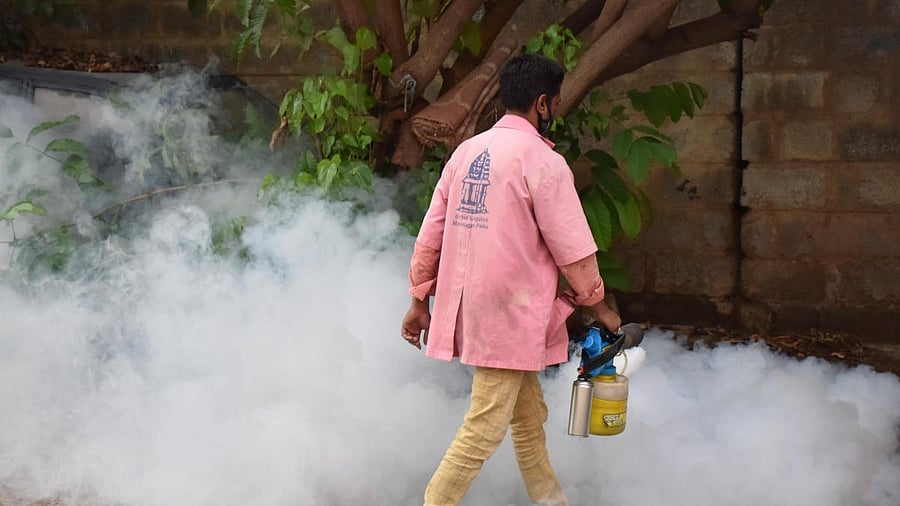
Representative image of BBMP worker fogging amid dengue cases in state.
Credit: DH File Photo
The number of dengue cases is rising alarmingly in the state capital, with the chief commissioner of Bruhat Bengaluru Mahanagara Palike (BBMP), Tushar Girinath, also testing positive.
The worst affected areas are Mahadevapura and the east zone. Cases breached 1,000 in June, representing a two-fold increase over last year. Nearly 2,500 cases have been reported in the past six months. Dengue has four strains. Once infected, a person develops long-term immunity from that strain, but is susceptible to the other three. Thus, potentially, a person can be infected four times in a lifetime, with each attack being more severe than the earlier one. While most people recover within a week, a severe form of dengue, which is a mosquito-borne illness, can cause internal bleeding, sudden drop in blood pressure, and in some cases, even death.
Thus, it is important not to ignore symptoms like fever, bleeding from the gums and nose, persistent vomiting, difficulty in breathing, fatigue, and restlessness.
The BBMP says the increase in cases need not set the alarm bells ringing as it is the result of increased surveillance and testing. Dengue is usually caused when a mosquito bites a healthy person after biting an infected patient. Increased surveillance and testing help identify and isolate the affected.
The decision to send samples of all symptomatic patients to a referral hospital is also welcome. The BBMP should not only intensify testing in areas traditionally prone to dengue, but also initiate a door-to-door larva survey. It should clear stagnant water and take up spraying and fogging, and create awareness.
While the civic authorities are responsible for initiating preventive measures, the public has a bigger role to play as the best precaution against dengue is to avoid mosquito bites.
It is common knowledge that mosquitoes usually breed in and around houses, in water that collects in old tyres, flowerpots, vases, and empty containers. While keeping surroundings hygienic, it also pays to wear clothing that protects the body from mosquitoes.
Several municipalities across India have begun imposing fines on households and commercial buildings if they allow water to stagnate or garbage to accumulate.
A few years ago, for instance, the Karnataka health department imposed a fine of Rs 5 lakh on a builder for not maintaining hygiene on his premises, after three students in a neighbouring school died of dengue. The battle against dengue can be won only when the authorities and the public join hands.
